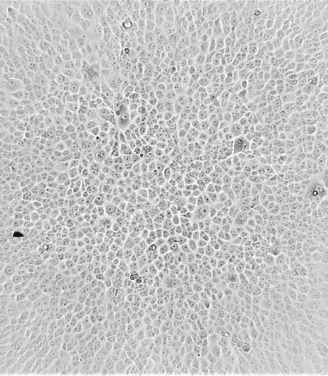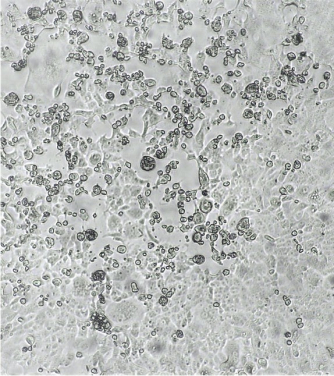Media
HKU microbiologists find that two doses of BNT162b2 (BioNTech ) or Coronavac (Sinovac) vaccines are inadequate against Omicron virus variants
14 Dec 2021

Cells are protected from killing by Ancestral SARS-CoV-2 after addition of serum from individuals vaccinated by Coronavac.

Cells are NOT protected from killing by Omicron virus despite addition of serum from individuals vaccinated by Coronavac.
- 1 / 2
- 2 / 2
Researchers at the Department of Microbiology of the University of Hong Kong (HKU) have found that most individuals after given two doses of the vaccine (either BioNtech or Coronavac) do not produce sufficient levels of serum antibodies against the new Omicron virus variant. The public is advised to get a third dose of the vaccine as soon as possible while awaiting for the next generation of more matched vaccine. The results of the study have been accepted for publication in the medical journal Clinical Infectious Diseases. It is available online as a preprint.
Background
The SARS-CoV-2 Omicron variant, first identified in November 2021, is spreading worldwide. This variant is particularly worrisome due to the large number of mutations in the virus that could affect infectivity or vaccine efficacy. To assess the effectiveness of existing COVID-19 vaccines in Hong Kong against this novel variant, researchers at the Department of Microbiology tested the ability of serum samples from fully vaccinated recipients to neutralize this variant. Serum neutralizing antibody titers are currently the only easily reproducible surrogate marker of protection against COVID-19.
Research findings
To test the ability of vaccine recipients' serum antibodies to neutralize the Omicron variant, the team used sera from two groups of vaccine recipients who have received two doses of BNT162b2 (BioNtech) or Coronavac. Each group consists of 25 people.
The study aims to more fully evaluate the health risk of the Omicron variant to the Hong Kong population and the need for a universal third dose.
Two Omicron variants present in Hong Kong were tested, one from South Africa and the other from Nigeria (with the additional R346K mutation). The ability of serum antibodies to neutralize the Alpha, Beta, and Delta strains was also tested as a control.
Only five out of 25 Biontech vaccine recipients had neutralizing ability against the Omicron variant virus, and the vaccine efficiency was significantly reduced to 20 - 24%. Compared to the original SARS-CoV-2 strain, the titer of neutralizing antibodies against the Omicron variant has decreased by 36 - 40 fold.
None of the serum of the 25 Coronavac vaccine recipients contain sufficient antibody to neutralize the Omicron variant at the limit of 1 in 10 dilution.
Implications of the study
1. The Omicron variant virus was able to reduce the effectiveness of two doses of COVID-19 vaccine, particularly against Coronavac. Therefore, COVID-19 vaccine recipients or even those recovered COVID-19 patients may be at a higher risk of breakthrough or reinfection. Our findings suggest that the design of the next generation of COVID-19 vaccine should consider sufficient coverage against this novel viral variant.
2. A third dose of COVID-19 vaccine is needed to enhance the antibody response against the Omicron variant.
3. Whether a third dose of the present Coronavac vaccine will enhance the neutralizing antibody response against the Omicron variant remains to be determined.
About the Research Team
Kwok-Yung Yuen, Henry Fok Professor of Infectious Diseases, Chair Professor of Microbiology, Li Ka Shing Faculty of Medicine, and Member of the Chinese Academy of Engineering and Director of the State Key Laboratory of Emerging Infectious Diseases, The University of Hong Kong
Kelvin To, Clinical Associate Professor, Department of Microbiology
Honglin Chen, Professor, Department of Microbiology
This research is funded by the Health and Medical Research Fund, the Food and Health Bureau, The Government of the Hong Kong Special Administrative Region.
The preprint of the study "Neutralization of SARS-CoV-2 Omicron variant by sera from BNT162b2 or Coronavac vaccine recipients" is posted at:
https://medrxiv.org/cgi/content/short/2021.12.13.21267668v1
A portable graphical link to the paper (QR code) can be obtained here: https://connect.medrxiv.org/qr/2021.12.13.21267668.
Media enquiries:
Communications and Public Affairs Office, The University of Hong Kong
Rashida Suffiad (Tel: 2857 8555, Email: rsuffiad@hku.hk)
Melanie Wan (Tel: 2859 2600, Email: melwkwan@hku.hk)
